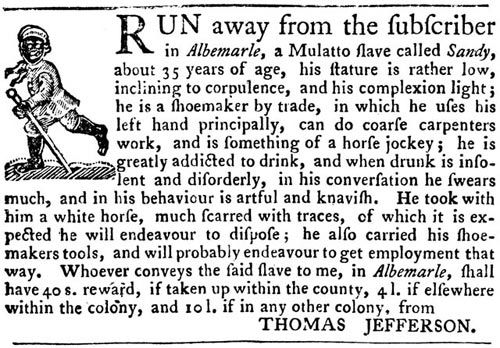
Of all the topics that I have written about as a historian none is more complex than the institution of slavery. You may recall the feature that I penned for Patriots of the American Revolution titled: “Race and Remembrance at Thomas Jefferson’s Monticello,” or the three-part series presenting a multi-racial view for The Jefferson Project titled “Jefferson and Slavery: Thoughts in Black and White.” I also blogged about: George Washington the emancipating slaveholder, racism and recruiting in the Continental Army, the realities of the 3/5’s Compromise and recollections of Christmas and slavery at Monticello. I am hoping to write an essay that further explores the story of Issac Jefferson as I feel like I am only beginning to scratch the surface of this topic.
You don’t have to be a historian to struggle with this subject. Even those with only a passing interest in our past can find racism difficult to discuss. Oftentimes we take the easy way out by telling ourselves to simply “keep things in context” and “not judge the past by comparing it to the present.” We remind ourselves that what was once commonplace then - isn’t commonplace now. This affirmation helps to dull the sting of racism. The most difficult part (in my opinion) of examining race and our country’s origin is admitting that our Founding Fathers were racist. In order to do that, we must reveal the faults in our heroes. After all these were some of the most brilliant men who ever lived, men who we owe the greatest debt of gratitude to, men who literally did the impossible by establishing a new nation dedicated to life, liberty, and the pursuit of happiness. If we were in ancient Greece these men would be our gods.
But…these titans of patriotism were also men who fought for freedom, while simultaneously depriving it to an entire race of people. We know that for certain. Yet in spite of this hypocrisy we are able to reconcile the faults of our Founders when celebrating their life. Who hasn’t admired George Washington’s courage or Thomas Jefferson’s brilliance when visiting Mount Vernon or Monticello? I certainly have. How many of us forget that they were also slaveholders? In recent years Mount Vernon and Monticello have both taken great steps to include the story of African-Americans in their exhibits. This effort has brought about a deeper understanding of slavery in relation to these men, but it still hasn’t enabled us to truly relate to them. To some people, the Founding Fathers are beyond reproach, while others vehemently condemn them. I believe that these extreme-attitudes do a great disservice to their memory. We must remember that they were human, capable of greatness and shamefulness.
My theory is that it is impossible for us to properly judge the Founders because we simply cannot relate to their time and place. We can’t relate because these men were never presented to us in any other capacity. Their likenesses grace our monuments and money. Our forefathers put them up on a pedestal where we continue to herald their achievements today. At the same time we forget that they once viewed African-Americans as property. This is where their racism is most evident. We react to this disturbing fact by subconsciously quantifying the issue to make it more acceptable. We remind ourselves that Washington freed his slaves upon his and his wife’s death and that Jefferson is believed to have fathered children with one of his. This rationalization dulls the sting of their prejudice.
The harsh reality is that no matter how 'well' a slaveholder treated their slaves, at the end of the day they were still slaveholders. A brutal example of this can be found in the inventory records of slaves that were kept by the overseers, as well as the advertisements that they placed in papers. These artifacts prove beyond a shadow of a doubt that these men viewed African-Americans as inferior.
The example above was placed in the September 14, 1769 issue of the Virginia Gazette by Thomas Jefferson who was offering a reward for the return of a runaway slave named Sandy. We know much about the life of the slaves on Mulberry Row and of Jefferson’s affection for many of them. At the same time we see here that he considered them personal property. Therein lays the conflict between admiring our Founders contributions while acknowledging their imperfections. It is a challenge that I still wrestle with no matter how much I read or write about the subject.
Updated: Friday, 1 April 2011 8:40 AM EDT
Permalink | Share This Post





